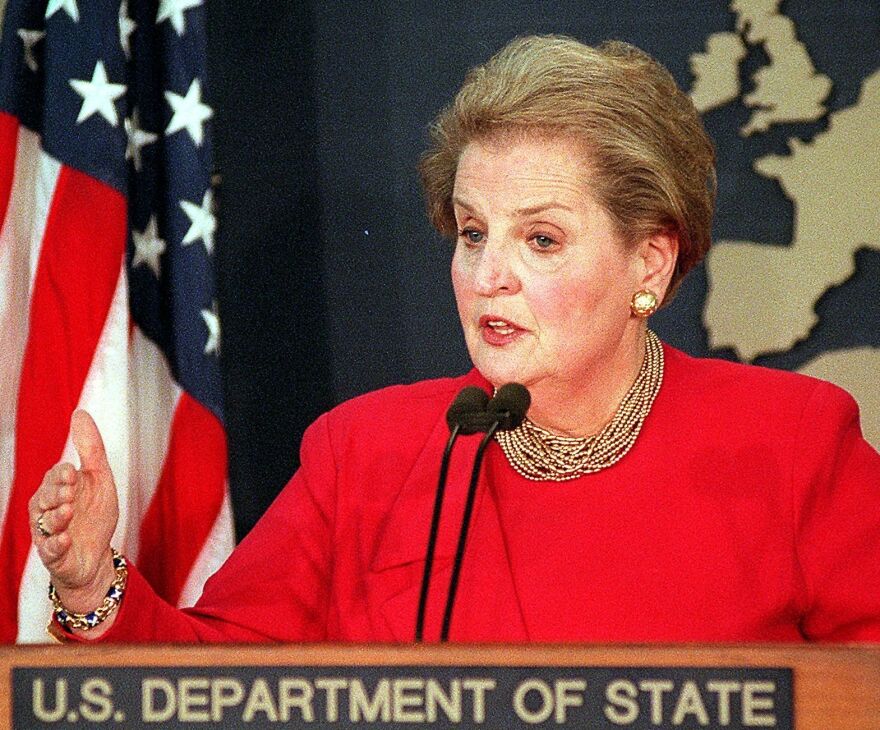When Madeleine Albright became secretary of state in 1997, she was the first woman to do so. It was an achievement that made her the highest-ranking woman in government at the time and one she took great pride in.
"I did love being a first," Albright said in September 2016 during a conversation with the National Museum of American History. "Being a woman was obviously a big breakthrough, and [I'm] very proud of that. But the fact that I could be secretary of state as a refugee and a naturalized American was a really big deal."
Albright, who also served as the U.S. ambassador to the United Nations, died Wednesday at the age of 84. The cause was cancer, her family said in a statement.
Her positions in government made Albright a role model for many other women, including her granddaughter, who once asked: 'So what's the big deal about Grandma Maddy being secretary of state? Only girls are secretary of state."
Throughout her career as a diplomat, Albright was outspoken about the benefits of women having a seat at the table.
"I really think that there was a great advantage in many ways to being a woman," Albright said during a TED event in 2010. "I think we are better, a lot, at personal relationships, and then have the capability, obviously, of telling it like it is when it is necessary."
She also worked to make women's issues central to American foreign policy, "not just because I'm a feminist," she said, "but because I believe that societies are better off when women are politically and economically empowered. That values are passed down, the health situation is better, education is better, there is greater economic prosperity."

The work to progress women's issues did not come without pushback. Albright recalled being told that these were soft issues, but she disagreed strongly.
"The bottom line that I decided was actually women's issues are the hardest issues, because they are the ones that have to do with life and death in so many aspects, and because, as I said, it is really central to the way that we think about things," she said.
Improving the situation for women wasn't only a domestic issue for her, but a global one. Albright believed that women who had a voice needed to help those who didn't.
She put her words into action many times including during her tenure at the U.N., when she worked with the other six women representatives to set up war crimes tribunals for the Balkans, where many Bosnian women were raped. Together, Albright said, the G7, or Girl Seven, worked to get two women judges to serve on the tribunal which ultimately declared rape as a weapon of war.

Despite serving as a role model to women around the world, Albright said there was a time early in her career when other women were not supportive of her, questioning her choices and her dedication to her family and children.
From that, her motto was born: "There's a special place in hell for women who don't help each other."
She repeated that phrase many times in her career, and for the most part, it resonated well with her audiences. But in 2016, Albright came under heavy criticism for using that line while campaigning for then-presidential candidate Hillary Clinton, who is also a former secretary of state.
Critics took the position that the use of that line on the campaign trail meant that Albright was saying any woman who didn't support Clinton was going to hell, and that despite one's personal politics they should support the candidate of their gender.
Albright acknowledged this in an op-ed in The New York Times.
"I absolutely believe what I said, that women should help one another, but this was the wrong context and the wrong time to use that line," Albright wrote. "I did not mean to argue that women should support a particular candidate based solely on gender. But I understand that I came across as condemning those who disagree with my political preferences. If heaven were open only to those who agreed on politics, I imagine it would be largely unoccupied."
She went on to explain her beliefs on why women should still support other women to help secure and progress the rights previous generations, including hers, fought for.
"My hope is that young women like my two granddaughters — those who have lived in a world where Roe v. Wade is the law of the land, who played school sports thanks to Title IX and who have never had to check "married" or "single" on a job application — will build on the progress we have made," she wrote. "But that will happen only if women help one another. And for those who do that, there will always be a special place of honor."
Copyright 2022 NPR. To see more, visit https://www.npr.org.







